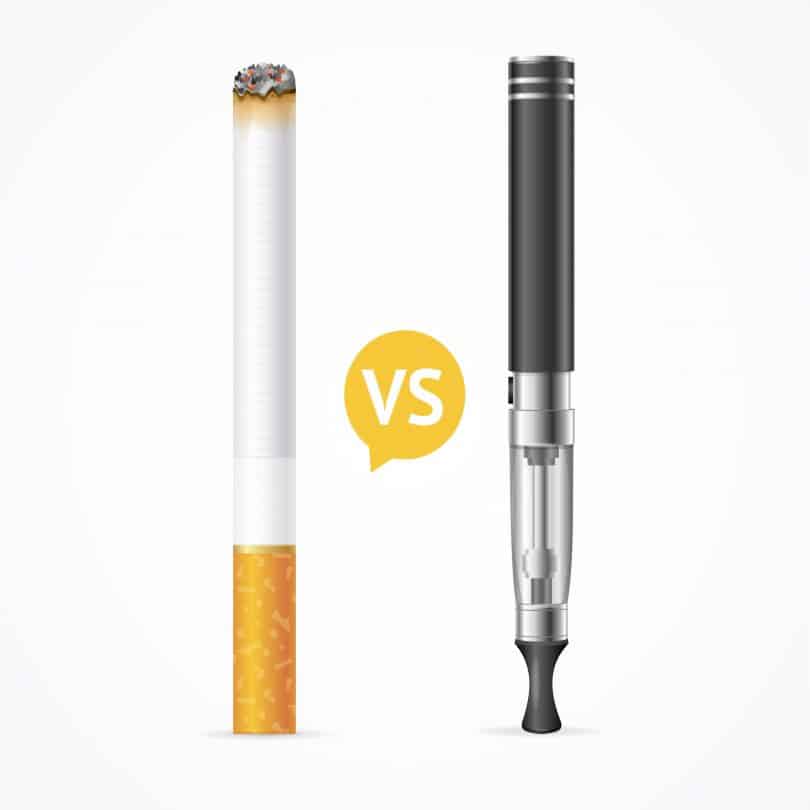There’s a lot of contradictory information spewed at us on a regular basis, and its hard to know the truth of things, especially when big corporations have reasons to want you to buy their products, and when governments take money from these entities. When it comes to vaping, tons of smear campaigns are out there, but are they saying anything useful? Unless vaping is tantamount to smoking, isn’t it automatically a better option? Let’s get into it, does vaping cause cancer or heart disease like smoking?
The detriments of smoking
First off, let’s take a look at standard smoking, and the issues that go with it. The first thing to understand on this topic, is that it’s not actually about cigarettes. Or more specifically, it’s not actually about tobacco. Tobacco can be used medicinally when not smoked, and has been for millennia. No one was dying from it before the use of cigarettes. The term ‘smoke inhalation’ refers to breathing in too much smoke, and the detrimental effects this can have. This refers to anything lit on fire and breathed in, whether its trees, plants, plastics, or tobacco.
Cigarette smoking is simply constant smoke inhalation. It makes the idea of buying organic tobacco, or switching to herbal smokable concoctions, a bit of a joke in the end. Sure, it might get a person away from some of the chemicals of standard processed tobacco, but it won’t get anyone away from the dangers that come from lighting something on fire, and breathing it in. Smoking cigarettes, as constant smoke inhalation, comes with a myriad of health problems, particularly for long-time users.
The bottom-line numbers tell a compelling story when looking at the generals of smoking damage. Every year, approximately 480,000 people die from smoking-related causes. A massive 41,000 of these are from secondhand smoke. As in, 41,000 people a year die from someone else’s smoking habit. In comparison, the US is up-in-arms over the growing drug overdose issue and the rising number of opioid deaths. These deaths account for just over 100,000 a year according to new CDC numbers, which make even opioids pale in comparison to the dangers of smoking.

What about a comparison to vaping? Though vaping hasn’t been around as long as smoking, starting mainly in the early 2000’s, it simply isn’t linked to a large death toll. As of 2020, the CDC could only come up with 68 related deaths, and all deaths were attributable to additives in vape liquid, and not to whatever compound was meant to be vaped, or the vaping itself. It bears mentioning here, that a dry herb vape is not included in this, and that this issue is specifically related to the use of vape cartridges.
Cancer and heart disease from smoking
Smoking is related to a huge number of problems, but the main two which lead to premature death, are cardiovascular issues, and cancer. Just how much damage do cigarettes do in these arenas? The CDC put out information detailing yearly death numbers from examining the years 2005-2009. As smoking has been around well over a hundred years, and reached higher levels of popularity in previous decades to this one, these dates are perfectly fine for understanding the situation today.
In terms of smoking related cancer deaths, approximately 163,700 people die of cancer yearly from smoking. When looking at cardiovascular disease, which includes heart disease, diabetes, and vascular disease, there are 160,000 deaths a year from smoking. There is however, another major class of deaths from smoking, and its related to respiratory diseases like pneumonia, influenza, and COPD. From this grouping there are about 113,100 deaths per year.
Now, let’s make this worse. Remember how 41,000 people die a year just from sitting in the same room as smokers? Well, about 7,333 of these deaths are from lung cancer, and 33,951 are from heart disease. There are that many cancer and heart-related issues, even when the afflicted person isn’t the one with the bad habit.
Does vaping cause cancer?
There is a lot of weird, seemingly nonsensical, information out there trying to tell you vaping is bad. However, when it comes to the actual questions of how to measure this, the answer just leaves more questions. Like why are we being told vaping is dangerous when no statistics back this up? I mean, if it was true, it would be attached to some pretty bad death numbers, right? Well, not exactly…
To be fair, vaping hasn’t been around for as long as smoking. The main surge of e-cigarettes and cannabis vape carts started in the 2010’s. However, as someone with asthma, I can personally attest to the fact that smoking causes damage in me pretty fast, whereas vaping does not. And I know this from how my lungs feel, and how I breathe. Perhaps it is possible to tell if vaping can cause something like cancer or heart disease early on, or at the very least, if it starts to cause the damage that leads in these directions.

According to the site Cancer Research UK, the answer to the question, does vaping cause cancer, is no. While the organization certainly doesn’t rule out that there could be negative side effects, it specifically states that vaping related deaths so far are only attributable to additives, and are not related to the act of vaping in general. The organization says this:
“You may have heard about vaping causing an outbreak of lung illness in 2019 in the United States. An investigation found the cases were linked to contaminated illegal products. It was not linked to vaping regularly or in the long term. There was no similar outbreak in the UK, and the chemicals of concern are banned in e-cigarettes here. There is no good evidence that e-cigarettes bought from legal places cause lung disease.”
What about secondhand vaping damage, does that exist? According to the same organization, “There is no good evidence that second-hand vapour from e-cigarettes is harmful. As vapes are still relatively new, we can’t be sure there aren’t any long-term effects to people who breathe in someone else’s vapour. But this is unlikely to be harmful.”
The site does, however, go on to repeat the oft mentioned incorrect assertion that, “Passive vaping is not the same as passive smoking. This is because e-cigarettes do not contain tobacco.” E-cigarettes, of course, often do have tobacco, and tobacco was never seen as deadly until it was used in cigarettes. The line that tobacco itself is bad has been repeated so much, that the idea of what smoke inhalation is, is often bypassed, even by the organizations that should really know the difference. Even with this misunderstanding, the site does make clear that there is no link between vaping and cancer.
Does vaping cause cardiovascular disease?
So, does vaping cause cancer? Well, even a cancer organization doesn’t think so, but what about cardiovascular disease? When searching for vaping and cardiovascular issues, a lot of negative sounding articles come up. But what doesn’t, is literally any statistic that backs up an issue. Again, as vaping is a relatively new phenomenon, this doesn’t mean that vaping isn’t associated with cardiovascular issues in the long term. However, there isn’t one statistic right now that says it does. In this review, the most that can be said, is that:
“There are no long-term outcome studies on the cardiovascular risk of vaping electronic cigarettes, but the effects of electronic cigarettes on known risk factors for cardiovascular disease, including neurohumoural activation, oxidative stress and inflammation, endothelial function and thrombosis, have been studied.” It didn’t, however, offer anything more conclusive than saying that risk factors have been studied.

What’s incredibly troubling, is that the 2019 study that initially made the claim that vaping e-cigarettes leads to a higher risk of heart attacks, was retracted eight months later! Sounds like it was a smear campaign that couldn’t take the heat in the end, and sadly, that article is still referenced all over the internet. No one ever said vaping would be 100% risk-free, but if it requires putting out research so bad it must be retracted to make the point, it says a lot for the lack of real information available to confirm this point. There is currently no statistic that exists about vaping and increased risk of cardiovascular disease.
To take it one step further, this longitudinal analysis E-Cigarette Use and Risk of Cardiovascular Disease: A Longitudinal Analysis of the PATH Study (2013–2019), reported that “Two large cross-sectional studies reported no significant association between exclusive e-cigarette use and cardiovascular disease (CVD).”
Conclusion
Does vaping cause cancer or cardiovascular disease? Well, the jury is technically out until more time goes by and research for long-term use can be collected. What has been made pretty clear on nearly every level, is that vaping is considerably healthier than smoking cigarettes when it comes to both cancer and cardiovascular issues, both of which are increased by smoke inhalation, which vaping is not.
So why is there so much out there screaming about the dangers of vaping? And doing so while hiding or ignoring the incredible death rate of smoking? Perhaps it has more to do with what groups are funneling money into government representative pockets, and less to do with the facts.
Thanks for joining us! We appreciate you stopping by Cannadelics.com, a top internet offering for independent news covering the growing cannabis and psychedelics industries.
Does vaping cause cancer like cigarettes? While the obvious answer is no, there seems to be plenty of confusion on this matter. This publication covers news stories in the emerging cannabis and psychedelics spaces. Follow along by signing up for the Newsletter, which also nets you access to information on products like vapes, edibles, and other devices, as well as cannabinoids, like HHC-O, Delta 8, Delta 9 THC, Delta-10 THC, THCO, THCV, THCP & HHC.










The reason there are no studies about a link between vaping and cancer is because vaping products have not been in existence long enough to have studies. Vaping nicotine is highly addictive. Vaping cannabis, may very well be less detrimental to the lungs. However, if there are additives in the mix, that could be dangerous to our lungs.